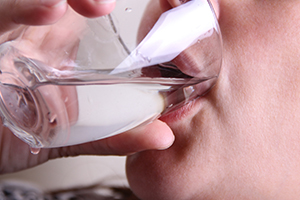
Dehydration and Dry Mouth can Affect Oral Health
If you only occasionally find yourself with a dry mouth, then it’s probably nothing to worry about. It’s just a natural sign of being thirsty. However, if the lack of saliva flow becomes a chronic condition, then it can become a dental issue.
That’s because saliva has an important function in the mouth. It provides lubrication when eating and chewing foods, and its enzymes begin the digestion process by breaking down food. Even when not eating, saliva keeps teeth protected. A healthy flow of saliva coats teeth and soft tissues, creating a protective barrier against bacteria and decay. For this reason, those with chronic Xerostomia (dry mouth) often experience bad breath as well.
There are several steps you can take if you experience chronic dry mouth:
- Stay Hydrated – Dehydration is a real danger, especially in the heat of summer or if working outdoors. Make sure to keep a bottle of water nearby and take water breaks often.
- At Night – Snoring or mouth-breathing while sleeping can also cause a dry mouth. If you find yourself with a dry mouth at night, keep a glass of water on your bedside table or try re-brushing your teeth to get saliva flowing again.
- Check Your Medications! – In older patients especially, many medications list dry mouth as a common side effect. Depending on your condition and the severity of your dry mouth, you may want to discuss other medication options with your doctor.
- Other Options – Chewing sugar-free gum is an easy way to stimulate saliva flow, and certain over-the-counter mouth rinses are designed for dry mouth. If the problem persists, there are also prescription medications available to treat the condition. Ask your doctor or dentist!
